There is now a full-fledged system of religious education in Russia, ranging from courses at mosques and madrasahs to the Bolgarian Islamic Academy. Unlike ancient madrasahs, the Academy, which is located in the ancient city of Bolgar, is a very young educational institution that trains Masters and Doctors of Islamic Sciences. We met with Acting Rector of the Academy Ainur Timerkhanov and talked about who was admitted to the Bolgarian Islamic Academy, how these were defended and what was the students’ research interests were.
‘The Academy’s mission is to train world-class theological scholars’
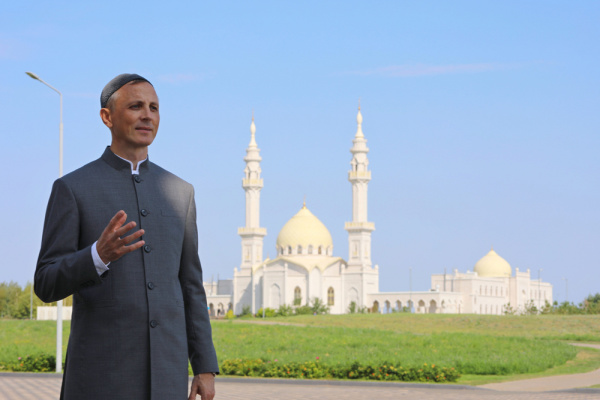
-Ainur Akhatovich, you recently took over as Rector of the Bolgarian Islamic Academy. Tell us a little about yourself.
-I was born and brought up in a family of ordinary workers in the village of Staraya Ikshmura in the Sabinsky District. My mother comes from the village of Satyshevo, which is famous for its madrasah built in the XVIII century, while the village itself was founded back in the period of the Kazan Khanate. Obviously, this fact somehow affected the lifestyle of my maternal grandmother – Zukhra. She was very pious and always performed salah and made dua. I believe that the Almighty has destined me to be in a sphere that is closely connected to service of Islam, and I am glad and grateful to the Almighty and fate.
In 1996, I graduated with honors from the English-Arabic Department of the Faculty of Foreign Languages at Kazan State Pedagogical Institute. I studied Turkish on an optional basis. In 1992 I had an opportunity to visit Turkey, where I underwent intensive Turkish courses for 3 months in an educational markaz in the city of Samsun. In 1994-95 I had an internship in Egypt, where I attended Arabic language courses for non-native speakers at Al-Azhar University. There I also completed two stages of professional English language studies at the British Cultural Centre. It is encouraging to me that a lot of young people from Tatarstan and other Russian regions that I met at that time graduated from the University, and now they have been prominent figures in the Muslim community of Russia for many years.
-You were appointed Vice-Rector for Research in December, and already this year you have become Rector of the Academy. What has changed since then? What have you managed to do?
-Initially, my work was related to several areas. Firstly, I ensured that the Academy management was constantly represented in Bolgar, where all the main educational process and all the vital activities of the educational institution take place. This allowed me to meet more often and communicate with teachers, primarily with foreign ones, and students. Naturally, we spoke the Arabic language, without any interpreters, which is very important for establishing warm and trusting relations on the personal level. This is of great importance when communicating with people from the East.
As you know, every year, many delegations at different levels visit the Academy, including from abroad. During that period, I have received more than a dozen such delegations, introduced them to the Academy and its work, and conducted negotiations. During those meetings, the foundations for further successful cooperation were laid.
-What goals are you setting for yourself now? After all, being the Rector of Russia’s unique and only Islamic Academy carries a certain responsibility.
-The main mission of the Academy has been defined at the level of the Russian President – the training of highly professional Muslim figures and theological scholars, who constitute the personnel elite of Russia’s Islamic community. This training should be based on the traditions of the national Islamic theological school, the restoration and development of which the Academy is aimed at. Naturally, these traditions and centuries-old experience of the development of Islam in our country, inter-religious and inter-confessional relations in different historical periods in the Ural-Volga region and the North Caucasus should be interpreted in light of the realities of modern life and the needs of the Muslim community and the country as a whole. All this together is intended to provide the conditions for unity of the ummah on the basis of traditional Russian Islamic theological school and the development of a modern, full-fledged, multi-stage system of Islamic education in Russia.
I would like to tell separately about the work of the Centre of Islamic Heritage, within the framework of which, as I said earlier, a laboratory with modern equipment for restoration and digitization of manuscripts has been set up. In the nearest future, we are planning to restore and put into circulation, and then into science, over three hundred manuscripts from our Fund.
What is the ideal student of the Bolgarian Islamic Academy like?
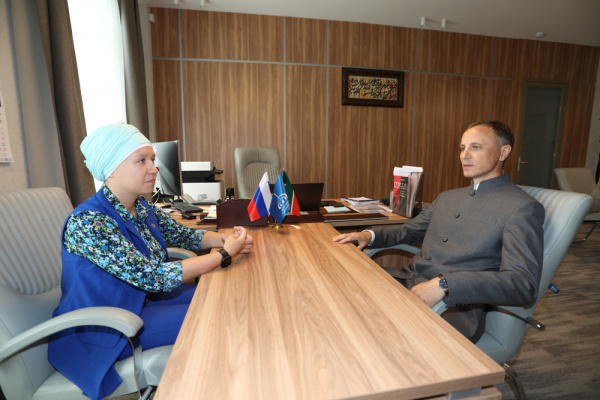
-What is the principle for selecting students at the Bolgarian Islamic Academy? What does one have to know to study there?
-In general, when recruiting applicants, we work primarily with muftiates and Islamic institutions of higher education and actively conduct admission campaigns. This has a lot to do with solving the issue of subsequent employment, which is just as important for us as it is for any secular university.
Traditionally, before the entrance exams, we hold Summer School, where applicants have an opportunity to listen to a series of lections on the methodology of theological research, the history of Islamic legislation, and to attend practical lessons in Arabic with a native speaker specializing in teaching Arabic to the foreign audience. As far as the entrance exams themselves are concerned, applicants for the Master’s program must have a Bachelor’s degree (Linguistics, Pedagogy, etc.), pass an Islamic Studies test, take a dictation in Arabic and be interviewed on the ‘Basics of Science’. For doctoral studies, it is a test in Islamic Studies and interview on the subject of scientific and theological activities.
90% of teaching at the Academy is in the Arabic language. It is therefore an absolute requirement that you should be able to speak Arabic at the level that allows you to study in it.
-How in demand is the Bolgarian Islamic Academy today among young specialists?
-This year’s competition for the Master’s program is four people per place and six – for the Doctoral program. This is comparable to last year’s figures, although there is an increase in the number of applicants for doctoral studies as well as for Masters in Theology. There are also girls who want to study. We are working on organizing training for girls as well, especially in doctoral studies.
The Bolgarian Islamic Academy is a synthesis of foreign experience and national theology
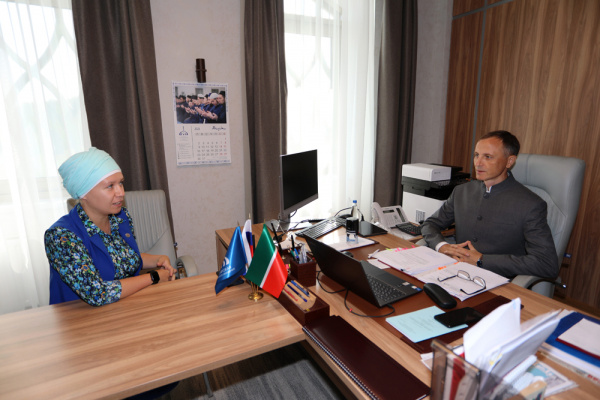
-What place do cooperation and interaction with the countries of the Islamic world occupy in the Academy’s activities?
-Currently, the consolidation and further development of relations with Muslim countries enjoy broad support in Russian society. In this direction, the Bolgarian Islamic Academy cooperates with the Strategic Vision Group ‘Russia – Islamic World’, established in 2006 under the leadership of Evgeny Primakov and Mintimer Shaimiev after the Russian Federation joined the Organization of Islamic Cooperation as an observer.
Taking into account that the Group’s priorities are the deepening of humanitarian cooperation, development of youth ties and exchanges and improvement of information flows and communication, the Group is expanding its partnership with the Bolgarian Islamic Academy in order to promote theological education and re-establishment of its own Islamic theological school in Russia, as well as intensifying work with young people. Practical example of such cooperation is, for instance, the project of the International Summer School ‘Bolgarian Dialogue of Cultures’. This year the school’s theme was ‘Education and Dialogue of Religions. The Experience of Russia and Countries of the Islamic World’.
-You have noted that there are many foreign specialists among leading teachers at the Bolgarian Islamic Academy. Could you tell us how the teachers were selected? Are there any specialists of this level in Russia today?
-Today, there are 4 foreign teachers and a number of visiting professors from leading Islamic universities around the world involved in the implementation of educational programs. They are Ismail Bolbol, Doctor of Islamic Studies and Arabic Studies, Mohamed Ayman Al-Zahrawi, Doctor of Islamic Fiqh and its Fundamentals, Adham Farraj, Doctor of Islamic Fiqh (Hanafi madhhab), and Saif Al-Asri, Doctor of Islamic Studies. Another lecturer from Al-Azhar University is expected to arrive permanently.
Up to 12 professors are engaged to conduct different courses within the framework of the Master’s program in theology. They are specialists from Kazan Federal University, the Centre for Islamic Studies of the Academy of Sciences of the Republic of Tatarstan, and university professors from Moscow, Rostov-on-Don and Makhachkala. Leading Russian and foreign Orientalists and representatives of other related scientific fields regularly conduct courses and deliver lectures. The list of such lecturers includes: Professor Leonid Syukiyaynen from the Higher School of Economics, Professor Rafik Mukhametshin, Rector of the Russian Islamic Institute, Abdurrazzak Saadi, Professor at the Islamic University in Amman (Jordan), former Counselor on Religious Affairs to the President of Iraq S. Hussein, Dr. Ali El-Konaissi, Professor at Ghent State University (Belgium), Ahmad Al-Karala, Professor at Al Al-Bayt University (Jordan), Ilyas Balka, Professor at Sidi Mohamed Ben Abdellah University (Morocco), Muhammad Tawfik Ramadan Al-Bouty, a scholar from Syria, and others.
-You have mentioned partners from regions of Russia and other countries. Who is the Academy cooperating with in educational and scientific fields? What are your plans for international activities? How is this work organized at the Academy?
-In the era of globalization, education, including religious one, cannot remain solely limited to the framework of one’s own culture and religious beliefs. Due to the importance of transmitting national, ethnic values and traditions, intercultural communication and multidirectional education with a focus on international cooperation and integration into the world’s cultural and educational space are also becoming imperative nowadays.
I would like to highlight the fact that we are not aiming to attract as many foreign students as possible. We are talking first and foremost about people from countries outside the CIS. This is not an efficiency criterion for us. But we work with foreigners since we realize the importance of this in terms of creating and promoting a positive image of Russia in the international arena, including in the Islamic world. At the same time, we are as interested as possible in working with our domestic audience, with those young people who are currently receiving religious education abroad.
The Academy has an international department which is responsible for this area. In the last two years, we have made active efforts to establish cooperation with national and foreign universities. For instance, we are actively expanding partnerships with Islamic centres and universities, including Al-Azhar University in Egypt, the World Muslim Communities Council in the UAE, Mohammed V University in Morocco, the Imam Bukhari Research Centre in Uzbekistan, Damascus University in Syria and many others. Agreements on joint activities have also been signed with universities in Jordan, the UAE, with colleagues from the Republic of Dagestan and the Chechen Republic. We are in constant contact with leadership of practically all Islamic universities in Russia.
Is PhD just a ‘sheepskin’ or a serious research paper?
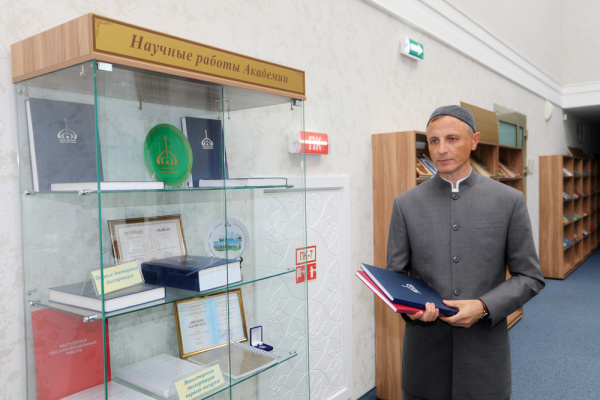
-Let us talk about the training of doctoral students. It is no secret that the Academy is expected first and foremost to produce notable results in training of doctoral theologians. Could you share the experience you have gained in this field and the problems and plans that exist?
-You are right. In this respect, the demands on the Academy’s activities and expectations of serious results from these activities are rather high. At the same time, I dare say that these expectations are overstated at times. Overstated in the sense that in such a short period of time it is impossible to prepare a world-class scholar-theologian who would be equally well aware of the current national agenda, would have a general broad view on international issues, etc., apart from his naturally deep knowledge in the field of Islam and Islamic theology, that is who would be the authoritative spiritual leader and intellectual, ‘talking head’ who would be able to convey Islamic and universal human values professionally and convincingly in the context of careful and respectful attitude to his homeland, its interests and achievements.
In 2019 and 2020, the first PhDs of Islamic Studies graduated from the Academy. Indeed, this is a unique, invaluable experience of training senior specialists in Islamic theology in the conditions of modern Russia. Of course, there are many challenges and tasks here, since the Academy is creating and implementing a lot of things for the first time.
We have a specific contingent coming to us. Most of them are people with good knowledge of the Arabic languages and fundamentals of Islam, Islamic sciences, but who are far from science and research work. There is also a language problem and a low level of general cultural competence. Students come from about 20 regions of Russia and, as I said, there are also foreign students. Accordingly, everyone has a different level of Russian language proficiency. At the same time, Arabic language proficiency, which makes a positive impression even among our Arab colleagues, is indicative. And how many of those who are sometimes sharply critical of the defense results at the Academy, without having a full grasp of the topic, are capable of conducting research and defending their results in the Arabic language, being a non-native speaker?!
-As far as we know, completed theses are defended at the specialized Dissertation Council. Which areas of research does it specialize in and who are the members of it?
-It must be said that the establishment of the Council was preceded by much painstaking work on studying the work of dissertation councils already in existence in Russia and abroad. Our Council is an international dissertation council of Islamic studies. It is this body that makes the decision to award the theological degree of Doctor of Islamic Studies to those who have successfully defended their theses. This decision is then approved by the Council of Founders of the Bolgarian Islamic Academy.
The authoritative composition of the Dissertation Council, represented by both Russian and foreign scholars and theologians, makes it possible to give the most objective assessment of the works submitted for defense, to timely point out the shortcomings in the disclosure of the topic, often in determining the conceptual approaches to the development of the problem identified within the framework of the thesis research.
As far as inclusion in the Dissertation Council is concerned, the main criterion for inviting a person to the composition is their scientific competence, professionalism in certain areas of Islamic sciences, availability of scientific and theological works. To date, the composition is represented both by leading national and foreign scholars and theologians. The first Chairman of the Dissertation Council in the history of the Academy, now a member of the Council, is Professor of the Bolgarian Islamic Academy, Dr. Ismail Bolbol (Palestine – Egypt). He is a well-known scholar in the Islamic world, who used to head the branch of Al-Azhar University in Palestine for over 10 years, former Mufti of Palestine. Last year Aiman Zakhrawi (Syria), Doctor of Shariah Sciences, a lecturer at the Academy, became the new Chairman of the Council, while Ruslan Sayakhov, a graduate of Al-Azhar University, now Vice-Rector for Academic Affairs at the Academy, became the Scientific Secretary.
What are the students at the Academy interested in?
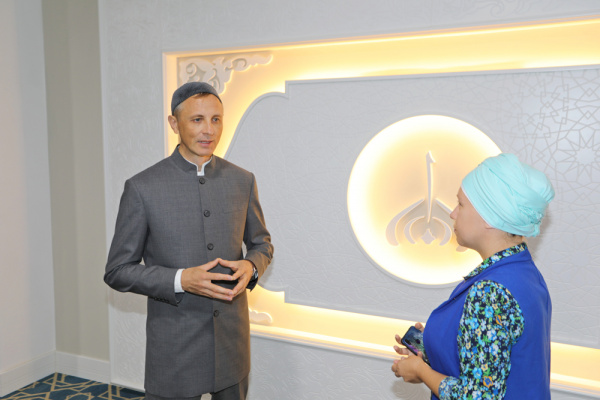
-What are the research interests of the Academy’s students? What topics do they focus on in their research?
-It is probably not quite right to talk about a free choice of topics for graduate qualification theses and dissertation research in doctoral studies. Topics are proposed and approved within the framework of the main priority areas of scientific and theological research of the Academy. In the first place, these are topics aimed at studying and introducing samples of our spiritual and cultural, theological heritage into wider scientific discourse. For instance, they are works by Suleiman bin Daud Saksini, Gabdunnasir Kursavi, Gabdurahim Utyz-Imiani, Shigabutdin Marjani, Musa Bigiev, Rizaaddin Fahrettin and others. It is also a question of exploring in research papers the urgent agenda of contemporary life that concerns the Muslim community in Russia.
Another area is research into the potential for the development of Russian Islamic theological schools in the light of the challenges of the future. We do realize the importance of being proactive in forecasting and anticipating possible problems that Muslims will encounter in the nearest future because of a variety of factors – global, regional, and local.
In this respect, we are also interested in the following topics: the national theological heritage of Shigabutdin Marjani, Musa Bigiev; the theological views of Rizaaddin Fahrettin; and the heritage of Dagestan theologians. The following topics are of particular interest to our students: ‘Contemporary Issues through the Prism of Shariah: Theological Assessment of Plastic Surgery Aimed at Improving Human Appearance’, ‘Revival and Development of Hafiz of the Quran in the Russian Federation Based on the Study of the Contribution of the World Reciter of the Quran Dr. Aiman Rushdi Suweidi’, as well as determining the pedigree of the child born of a surrogate mother.
-Are there works that explore the characteristics of different currents in Islam? Can such studies reduce the level of extremism in society?
-I would like to note that among the academic disciplines in the Master’s program, there is a subject called ‘Islamic Doxography (sects, currents), which is taught by Said Shagaviev. As far as the research activity itself is concerned, each of the works of our students, in one way or another, works to reduce extremism attitudes in society, including through enlightenment and introduction to the traditional theological school. Such works contribute to raising the level of literacy of Muslims and interested audience in the most important religious issues, which are revealed and evaluated from the perspective of our theological heritage.
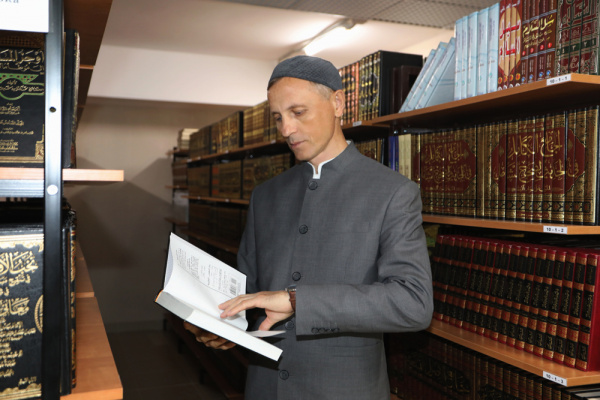
-Share your upcoming plans: what conferences, forums and other activities are planned at the Academy?
-Every year we hold about 50 events of a scientific and educational nature. These are conferences, forums, round tables, seminars, open lectures, thematic evenings and intellectual games. Every month the Academy’s library holds thematic evenings dedicated to life and work of world-famous theologians, literary and cultural figures of various peoples; exhibitions are held.
At the end of September, it is planned to hold the II International Scientific Practical Conference ‘Islamic Studies and Islamic Theology in the Modern Education System: Problems and Prospects’. The aim of the conference is to discuss current theoretical and practical issues of the formation and development of Islamic studies and Islamic theology in the context of the implementation of FSES 3++ in theology.
Perhaps the central event is the annual International Forum ‘Theological Heritage of Muslims in Russia’, which will be held in October 2021 for the third time. The forum program includes 4 conferences (Bolgarian Readings, Readings named after Marjani and others), presentations of new works, master classes and two conferences of international status. Among them there is also the international student conference devoted to the discussion of the formation of civil identity of Muslim youth in Russia and abroad.
Ilmira Gafiyatullina






